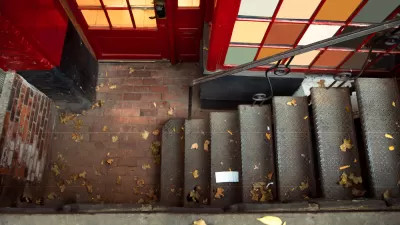In the wake of multiple building collapses in recent years, the bill seeks to identify dangerous building conditions before they escalate.

A new city law will mandate ‘proactive’ building inspections in New York City, reports Nish Amarnath in Smart Cities Dive. “Int. 0904, the Billingsley Terrace Structural Integrity bill, requires the New York City Department of Buildings to create a risk-based inspection program that can identify dangerous buildings using a model to predict the likelihood of structural failures by assessing factors such as building data, violation history and any prior facade inspection reports.”
The bill aims to prevent building collapses and dangerous conditions in older buildings by identifying risks. “Bill Int. 0904 seeks to address deficiencies in the DOB’s complaints-driven, reactive inspection process — an issue that has surfaced in the city’s aging building stock and recent incidents, including the Billingsley Terrace collapse in the Bronx and the parking garage collapse in lower Manhattan, the city council said in the release.”
If signed by the mayor, the bill would require the DOB to develop a predictive model for the inspection program that would take into account a variety of building data including “qualified exterior wall inspector certification history, prior maintenance records, the number of 311 complaints filed, permit history, the date of the most recent alteration,” as well as building age, size, materials, floors, and more. Owners of buildings found deficient would have to submit a corrective action plan to make the building safe.
FULL STORY: NYC Council approves legislation requiring proactive building inspections

Alabama: Trump Terminates Settlements for Black Communities Harmed By Raw Sewage
Trump deemed the landmark civil rights agreement “illegal DEI and environmental justice policy.”

Planetizen Federal Action Tracker
A weekly monitor of how Trump’s orders and actions are impacting planners and planning in America.

The 120 Year Old Tiny Home Villages That Sheltered San Francisco’s Earthquake Refugees
More than a century ago, San Francisco mobilized to house thousands of residents displaced by the 1906 earthquake. Could their strategy offer a model for the present?

Ken Jennings Launches Transit Web Series
The Jeopardy champ wants you to ride public transit.

BLM To Rescind Public Lands Rule
The change will downgrade conservation, once again putting federal land at risk for mining and other extractive uses.

Indy Neighborhood Group Builds Temporary Multi-Use Path
Community members, aided in part by funding from the city, repurposed a vehicle lane to create a protected bike and pedestrian path for the summer season.
Urban Design for Planners 1: Software Tools
This six-course series explores essential urban design concepts using open source software and equips planners with the tools they need to participate fully in the urban design process.
Planning for Universal Design
Learn the tools for implementing Universal Design in planning regulations.
Clanton & Associates, Inc.
Jessamine County Fiscal Court
Institute for Housing and Urban Development Studies (IHS)
City of Grandview
Harvard GSD Executive Education
Toledo-Lucas County Plan Commissions
Salt Lake City
NYU Wagner Graduate School of Public Service





























